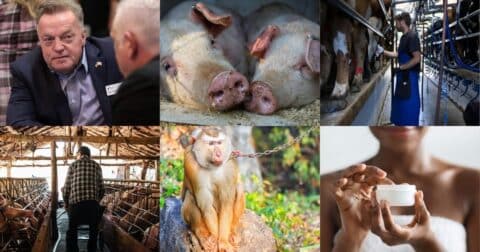News
Grasslands and Wetlands Are Being Gobbled Up By Agriculture, Mostly Livestock
Research•4 min read
Review
Sentient’s staff picks the stories that stuck with us.


Words by Rachel Krantz
As senior editor at Sentient, I get to be surprised about the reality of our food systems on a regular basis. Unfortunately, usually the news isn’t good — often the surprise is a new fact about corporate and government corruption, or the inhumane treatment of workers and animals. More than once this year, a surprising new fact has changed the way I shop for food.
Curious to see what I might have missed, I asked the editorial staff at Sentient to name the most surprising thing they learned at work in 2024. Here are their answers.
“The most surprising thing I’ve learned in my last year of writing for Sentient, by far, is the fact that in most regards, organic food is worse for the environment and no healthier than non-organic food. It depends on what type of food is being farmed, but on the whole, organic farming requires more land and causes more water pollution than non-organic farming, while emitting roughly the same amount of greenhouse gasses.”
Read the story: Why Eating Organic Isn’t a Climate Solution
–Seth Millstein, Science and Explainers Reporter
“I can’t choose just one! Some of the biggest surprises this year impacted how I think about shopping ethically for food, even as someone who was already vegan. There’s the fact that certain brands of coconut milk use forced monkey labor; organic produce is not actually better for human health or the environment; palm oil is not automatically worse than other oils for the environment and animals, and recycling and composting labels are mostly regulated, and might not actually lead to packaging getting reused.”
—Rachel Krantz, Senior Editor
Read the stories: Why Coconut Milk Isn’t the Most Ethical Plant-Based Milk; Is Sustainable Palm Oil Ethical – or Just Greenwashing?; These Food Labels and Symbols Don’t Mean What You Think
“One thing that I found shocking from my reporting this year is the blatant disinformation policymakers will spread in order to stop progress on climate issues. A bill in Arizona would have stripped government funding from numerous programs in the state, including any program encouraging people to eat less meat. Making matters worse, the bill was introduced under the guise of protecting freedom, while it could have substantively reduced constituent’s access to services like public transit or expanded bicycle lanes!”
–Grace Hussain, Solutions Correspondent
Read the story: How City Climate Plans Became a Culture War Target
“I was surprised to see how many pork farmers were willing to speak up for keeping California’s Prop 12, going against the Farm Bureau and the National Pork Producers Council. It’s incredibly hard for farmers to challenge their own industry’s lobby groups, but a growing number are doing just that, and I’m curious to see where this goes in 2025.”
–Jenny Splitter, Editor-in-Chief
Read the story: Meet the Farmers Supporting Prop 12 Despite Pork Industry Pushback
“Collagen production doesn’t always consist of leftovers from animal farming, as consumers might believe. Turns out, bovine collagen used in wellness products actually contributes to large-scale deforestation in the Amazon rainforest, and violence against Indigenous peoples.”
–Dawn Attride, Editorial Fellow
Read the story: The Ugly, If Unsurprising, Truth About Collagen
“For me, learning more about bird flu and its jump from birds to cows and humans has been fascinating, yet worrying. The role of animal agriculture in facilitating the spread of diseases like bird flu is especially concerning, just knowing that the current system seems to only exacerbate the risks. It’s also unsettling, since more human cases are popping up.”
–Gabriella Sotelo, Editorial Fellow
Read the stories: Avian Flu: Sentient’s Latest Stories
“My most surprising observation of 2024 is how the trend toward more ‘natural’ living — such as homesteading, clean eating and chemical-free beauty — has evolved into such an animal-based lifestyle (raw milk, home-butchery, tallow moisturizer, etc.). It’s even a sort of rebellion against all things plant-based. Perhaps less surprising is the trend’s hidden roots in Big Meat industry marketing and influence.”
–Jessica Scott-Reid, Disinformation and Culture Correspondent
Read the stories: Homesteading Is a Viral Trend, but ‘Butchery Gone Awry’ Is Its Dark Side; Avian Flu Is Spreading, and the Raw Milk Trend Could Make It Worse; The Skin Benefits of Beef Tallow Are Lathered on Thick